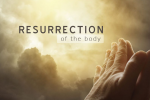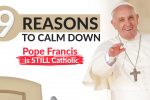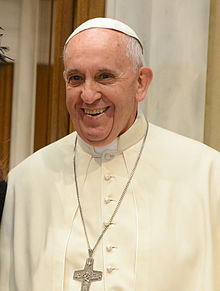Is the Canon of Scripture Unchangeable?

Is the Canon of Scripture Unchangeable?
The Catechism of the Catholic Church (CCC), section 120, declares:
It was by the apostolic Tradition that the Church discerned which writings are to be included in the list of the sacred books. This complete list is called the canon of Scripture. It includes 46 books for the Old Testament (45 if we count Jeremiah and Lamentations as one) and 27 for the New” [CCC then lists all of the books of the Old and New Testaments].
Notice, the Catechism takes it as a given that the process of discernment is:
- In the past tense—discerned. It’s over. There is nothing left to be discerned in this matter concerning the canon. And that includes discerning which books should be included and which books should be shunned. That discernment is in the past.
- It is a matter of Sacred Tradition with a “capital T,” meaning it is part of the deposit of the Faith of the Church that cannot change. The Church is very careful in the entire CCC to distinguish between capital “T” Tradition and small “t” traditions. The former is fixed and unchangeable. The latter is not, necessarily. CCC 83 is an excellent example of this. Under the heading of: “Apostolic Tradition and ecclesial traditions,” the Church declares:
The Tradition here in question comes from the apostles and hands on what they received from Jesus’ teaching and example… Tradition is to be distinguished from the various theological, disciplinary, liturgical, or devotional traditions, born in the local churches over time… In the light of Tradition, these traditions can be retained, modified or even abandoned under the guidance of the Church’s magisterium.
Notice the very important distinction between “Tradition” and “tradition?”
- It is called a “complete list.” Complete means… complete. Thus, not only would it be contrary to the Faith to say any of the 73 (72 if you put Lamentations and Jeremiah together as one) books of the Bible could be removed from the Canon; it would be equally contrary to the Faith to say one could add to the books of the Bible.
Moreover, the Catechism footnotes (90-91) are illuminating here, beginning with footnote 91, from CCC 120. Here the Church cites three Magisterial documents in the context of the question of the canon of Scripture that give us great insight into just why the fathers of Vatican II considered the canon of Scripture to be complete. And these quotes are illuminating because they serve to take us through centuries of Catholic teaching, beginning in the 4th century, and taking us all the way back to CCC where we started.
- Pope St. Damasus I from the Council of Rome, 382:
Now indeed we must treat of the divine Scriptures, what the universal Catholic Church accepts and what she must avoid.
This is not an infallible declaration because the Council of Rome was a local council. It was not a declaration to the Universal Church. That would be essential, along with the necessary essential language, for it to be an infallible decree. However, it is crucial nonetheless because it established a principle that seems to be peppered into magisterial documents over the centuries concerning this question that led up to the above citation from Vatican II. And that is, the lists given for the Canon of Scripture, beginning here with Pope St. Damasus—and using various terms—indicate that the canon is not only telling us what is canonical, but also what is not; namely, everything else.
- CCC also quotes the Council of Florence – the Bull of Union with the Copts – Cantate Domino, of Feb. 4, 1442:
[The Holy Roman Church] professes that one and the same God is the author of the old and the New Testament, that is, of the law and the prophets and of the Gospel; since the saints of both Testaments spoke under the inspiration of the same Holy Spirit, she accepts and venerates their books, whose titles are as follows… [The Council then lists the same can as Pope St. Damasus]
Here, the language seems to clear again that this is an exhaustive list because it says “the saints of both Testaments spoke under the inspiration of the… Holy Spirit” followed by saying the Church “accepts and venerates their books, whose titles are as follows…” This does not leave any possible room for other titles to be added from either Old or New Testament saints. They are all here. “[Their] titles are as follows…”
Moreover, when Pope Eugenius promulgated this great Papal Bull he declared the Canon of Scripture to be among the essential teachings the Copts had to accept to be received into the Church:
We, therefore, to whom the Lord gave the task of feeding Christ’s sheep, had abbot Andrew [who was sent as representative of the Coptic Patriarch John] carefully examined by some outstanding men of this sacred council on the articles of faith, the sacraments of the church and certain other matters pertaining to salvation. At length, after an exposition of the catholic faith to the abbot, as far as this seemed to be necessary, and his humble acceptance of it, we have delivered in the name of the Lord in this solemn session, with the approval of this sacred ecumenical council of Florence, the following true and necessary doctrine…
The Canon of Scripture was obviously one of these “necessary” doctrines “pertaining to salvation.”
- And finally, CCC cites the definitive words from the Council of Trent, Session IV, Decree on the Reception of the Sacred Books and Traditions:
The council clearly perceives that this truth and rule [of the Gospel] are contained in the written books and unwritten traditions that have come down to us, having been received by the apostles from the mouth of Christ himself or from the apostles by the dictation of the Holy Spirit, and have been transmitted, as it were, from hand to hand.
Even though the Council of Trent does not use the “capital T” – “lower case t” distinction that the Church would later use, and as we saw from CCC 120, it is clear from the context, the “traditions” being spoken of here are what we would call “capital T” Traditions that are unchangeable. “… this truth and rule [of the Gospel] are contained in the written books and unwritten traditions that have… been received by the apostles and from the mouth of Christ himself or from the apostles by the dictation of the Holy Spirit…” The Council continues:
Following, then, the example of the orthodox Fathers, it receives and venerates with the same sense of loyalty and reverence all the books of the Old and New Testament—for the one God is the author of both—together with all the traditions concerning faith and practice, as coming from the mouth of Christ or being inspired by the Holy Spirit and preserved in continuous succession in the Catholic Church.
There can be little doubt that here we are speaking of either infallible matters of faith and morals or matters of divine law in the practice of the Faith that are unchangeable when the Fathers say, “… for God is the author of both—together with all the traditions concerning faith and practice, as coming from the mouth of Christ or being inspired by the Holy Spirit and preserved in continuous succession in the Catholic Church.” And it is in this context that the Council Fathers say in their very next breath:
The council [Synodo] has thought it proper to insert in this decree a list of the sacred books, so that no doubt may remain as to which books are recognized… [Here the list is recounted]
It seems CCC 120, in footnoting these Magisterial documents, and using the language it uses, is making it quite clear that the Canon of Sacred Scripture is “complete.” There can be no additions or subtractions ever.
Vatican Council I Pipes in
But now, let us continue the trek through the centuries of Church history, heading back to the Catechism of the Catholic Church where we started. The above documents served as our first points of contact. Now we come to the First Vatican Council, Session Three, The Dogmatic Constitution on the Catholic Faith, Dei Filius, Chapter 2, On Revelation, which declares:
Now this supernatural revelation, according to the belief of the universal Church, as declared sacred Council of Trent, is contained in written books and unwritten traditions, which were received by the apostles from the lips of Christ himself or came to the apostles by the dictation of the Holy Spirit and were passed on as it were from hand to hand until they reached us. The complete books of the old and the New Testament with all their parts, as they are listed in the decree of the said council and as they are found in the old Latin Vulgate edition, are to be received as sacred and canonical.
Notice, the books listed by the Council are said to be “complete,” once again. It seems unthinkable that one could either add to or take away from “the complete” list of inspired books “as they are listed in the decree of [the Council of Trent].” And, the Council adds, this is “the belief of the universal Church.” That seems clearly to mean this teaching is unchangeable.
And finally, I would like to put on the table, footnote 90, from CCC 120, that I listed but did not cite above, which cites the Dogmatic Constitution on the Church, Dei Verbum 8:3, from the Second Vatican Council. This quote will bring us full circle back to CCC 120 where we started:
By this tradition comes the Church’s knowledge of the full canon of biblical books; by this too, the scripture itself comes to be more profoundly understood and to realize its power in the Church. In this way the God who spoke of old still maintains an uninterrupted conversation with the bride of his beloved Son.
Notice, the fathers of Vatican II understood what we have seen throughout the centuries of magisterial teaching: as Catholics we possess “the full canon of biblical books.” Moreover, if you back up to paragraph 1 of section 8, Dei Verbum had already stated that:
… the apostolic preaching, which is expressed in a special way in the inspired books, was to be preserved by a continuous succession until the end of time. This is why the apostles, handing on what they had received, warn the faithful to hold fast the traditions which they had learned, either by word of mouth or by letter (see 2 Thess. 2:15) … The expression “what has been handed down from the apostles” includes everything that helps the people of God to live a holy life and to grow in faith. In this way the Church… perpetuates and hands on to every generation all that it is and all that it believes.
These words speak for themselves. The Canon of Scripture is a fixed, complete, and unchangeable canon that cannot be added to or taken away from. This is the stuff of infallibility not by a single, infallible decree of a pope or a Council, but by it being the teaching of the Universal and Ordinary Magisterium of the Church, i.e., taught by all the bishops throughout the world in union with the pope.
What About Canon Law?
Many will reject what I have said above for two essential reasons. 1. No declaration I have cited carries the theological note of infallibility. And 2. They do not meet the criterion of Canon 749, §3 in the Code of Canon Law:
No doctrine is understood as defined infallibly unless this is manifestly evident.
A good and important question, indeed.
However, that canon does not apply to this discussion. Canon 749 speaks of infallible definitions. And these can be “defined” by the pope, Ecumenical Councils or the Universal and Ordinary Magisterium. However, in this case, we are not talking about a decree of the pope or the bishops in union with the pope that carries the theological note of infallibility. There is another, and very common way the Church speaks infallibly. In the Doctrinal Commentary on the Concluding Formula Professio Fidei, of 1998, 9, the Congregation for the Doctrine of the Faith, with the approval of Pope St. John Paul II, declared:
The Magisterium of the Church, however, teaches a doctrine to be believed as divinely revealed… or to be held definitively… with an act which is either defining or non-defining. In the case of a defining act, a truth is solemnly defined by an “ex cathedra” pronouncement by the Roman Pontiff or by the action of an ecumenical council. In the case of a non-defining act, a doctrine is taught infallibly by the ordinary and universal Magisterium of the Bishops dispersed throughout the world who are in communion with the Successor of Peter. Such a doctrine can be confirmed or reaffirmed by the Roman Pontiff, even without recourse to a solemn definition, by declaring explicitly that it belongs to the teaching of the ordinary and universal Magisterium as a truth that is divinely revealed… or as a truth of Catholic doctrine… Consequently, when there has not been a judgment on a doctrine in the solemn form of a definition, but this doctrine, belonging to the inheritance of the depositum fidei, is taught by the ordinary and universal Magisterium, which necessarily includes the Pope, such a doctrine is to be understood as having been set forth infallibly. The declaration of confirmation or reaffirmation by the Roman Pontiff in this case is not a new dogmatic definition, but a formal attestation of a truth already possessed and infallibly transmitted by the Church.
The teaching of the Church concerning the Canon, as we have seen, does not involve a “defining act… solemnly defined by an ‘ex cathedra’ pronouncement by the Roman Pontiff or by the action of an ecumenical council.” However, with all we have seen, the Canon has been taught to be “closed”
or “complete,” and that it is part of the Deposit of Faith “once for all delivered unto the saints,” or so closely related to it that there is an inherent connection. It has been taught to be a part of the unchanging and unchangeable capital “T” Tradition of the Church. Moreover, it has been affirmed, or re-affirmed again and again by popes and Councils throughout the centuries resulting in the conclusion that the Canon of Scripture involves a truth of the Faith infallibly transmitted by the Church in a non-defining act of the Ordinary Magisterium that calls for the assent of divine faith from members of the Catholic Church.
Deo gratias!






